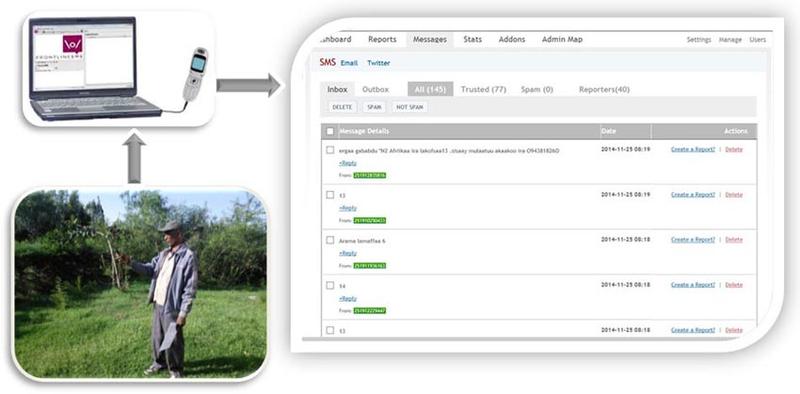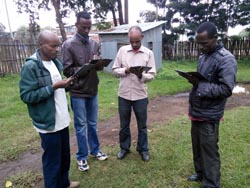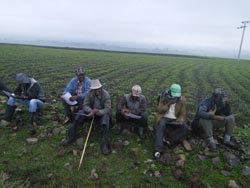In the 2014 growing season, two digital data collection methods were explored in Ada’a and Damot Gale districts of Ethiopia. The first approach is using Google Nexus tablets by extension workers and research technicians to collect both agronomic and socio-economic data. The second approach is using SMS method in which farmers send information on agronomic practices using SMS (Crowdsourcing). The SMS method is being carried out in Ada’a district, where 50 farmers are participating in the pilot test. For the tablet version of data collection, existing paper based questions (Fieldbook) were converted to easy-to use electronic versions (XML). The Open Data Kit (ODK) was installed in the android based nexus tablets and used to read the XML file and collect information both at the household and field level.
ODK is a free and open-source set of tools used for collecting and managing data in low-resource environments. It provides a set of tools to build a data collection form, to collect data on digital devices and send it to a server and aggregate the collected data and extract it in useful formats. In addition, ODK enables to use the camera and GPS features of the tablet to collect other types of data. In the pilot test, the GPS coordinates of the household and N2Africa fields are collected, and the camera feature is used to capture any incidences in the N2Africa field (e.g. incidence of pests and disease).

Figure 1: An overview of the data collection process using tablets by extension workers from field data collection to central data storage and access by different users

Figure 2: A farmer participating in N2Africa trials sending SMS (left) and an overview of the SMS messages send by participating farmers in Ada’a district (right).
For the SMS data collection method, free desktop software, FrontlineSMS application, was installed in the national office and used to manage all incoming SMS messages from the farmers. A GSM modem together with a local SIM card was used to connect the FrontlineSMS to a mobile network. FrontlineSMS does not require the internet to work, but does need to be connected to a mobile network. In order to simplify the data sending process and overcome the illiteracy of farmers, laminated A4 paper with all the short codes written in the local languages was provided to the farmers so that the farmers could refer to this paper for the codes when they needed to send SMS related to their agronomic activities. For example farmers send "1" for date of land preparation, "2" for planting date etc. In addition, farmers received air time credit to their mobile phones to cover the cost of sending SMS.
Before the start of the growing season, training was given both to extension workers and to farmers on how to use the technology. Extension workers received hands-on training on how to operate the tablets and use the ODK application installed on the tablets. Farmers who did not have the experience of sending SMS were briefed on how to send SMS using their own basic phones. During this time, farmers were asked about their motivations for sending SMS and the majority of them indicated that they feel considered part of the research and were very enthusiastic.
 |
Left: Extension workers hands-on training on how to use the tablet and use the ODK application to collect data Right: Training of farmers on how to use the short codes and send cropping calendar of N2Africa field using SMS |
 |
Future potential of SMS data collection in N2Africa projects
With the current set up, farmers who are participating in the adaptation trials do not have frequent contact with extension workers and researchers. As a result, there is limited opportunity for the researchers to get feedback from farmers about the performance of the trials managed by farmers. The experience from the pilot test can be a starting point to use the SMS method to gather feedback from large numbers of farmers participating in the adaptation trials if needed. The SMS method can also be used by implementing partners to send reminders to the farmers about a specific activity or event, to provide information about agricultural input suppliers and even to connect farmers with potential buyers.
Eskender Beza
